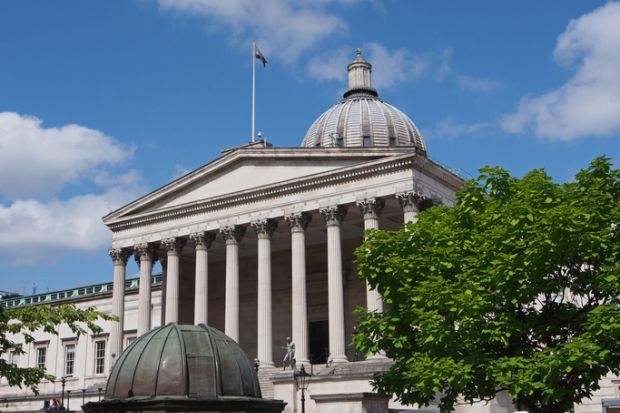The former president of UCL was paid £25,000 extra to delay his retirement and “support the university through the Covid-19 crisis” before his successor started in post, it has emerged.
Michael Arthur, who stepped down as head of the institution when current president Michael Spence joined in January this year, had been due to retire at the end of the 2019-20 academic year.
But according to UCL’s accounts he received a “single exceptional payment” of £25,000 in July 2020 – paid in addition to his normal salary – after UCL asked him to stay on and cover the gap until Professor Spence took over.
Together with another one-off payment, included in his 2019-20 basic salary of £410,232, of almost £25,000 relating to a change in taxable benefit rules, it meant Professor Arthur’s total remuneration rose 16.5 per cent in his last full year in office, to £472,000.
The figures emerged as a report on senior leaders’ pay from the Office for Students published details of the highest levels of salaries and total remuneration in the English sector in 2019-20.
Many of the biggest pay packets and increases had previously come to light following publication of individual financial accounts, including extra payments of almost £200,000 received by the former heads of the universities of Exeter and Bedfordshire.
The £185,200 bonus for Exeter’s previous vice-chancellor, Sir Steve Smith, put the institution at the top of the list for universities dishing out the highest remuneration in 2019-20, at £584,000. Bedfordshire, which gave its former head Bill Rammell £187,000 as “compensation for loss of office”, was ranked 10th with a total of £447,000, which also included payments to its incoming vice-chancellor.
Professor Arthur received the highest basic salary in the sector, followed by Stephen Toope at the University of Cambridge (£379,000) and Louise Richardson at the University of Oxford (£374,000).
Some of the biggest percentage increases in pay were at smaller specialist institutions and private providers.
For total remuneration, they included a 156 per cent increase in total remuneration, to £179,000, for the head of Essex-based alternative provider, the London School of Academics, and a 47.9 per cent rise, to £207,000, for the outgoing head of Leeds Conservatoire, due to a £65,000 compensation for loss of office.
Other big rises in total remuneration were reported for the heads of alternative provider UCK Limited (17.8 per cent to £298,000), the Royal Northern College of Music (16.2 per cent to £194,000) and Plymouth Marjon University (12.8 per cent to £229,000).
Overall, the report said mean pay for heads of providers had only risen slightly across the sector in 2019-20, from £218,000 to £219,000 for basic salary and £267,000 to £269,000 for total remuneration, saying these increases were less than the 1.8 per cent increase offered by employers to staff that year.
The report goes on to say there “is evidence of pay restraint in the sector”, basing this assessment on average remuneration plateauing over the past three years and little change in the distribution of salaries across pay bands.
But the University and College Union’s general secretary, Jo Grady, said figures in the report “further expose the cavernous gap in pay between university staff and management”.
“Vice-chancellors on average are now enjoying a total remuneration of £269,000 per year and they should now look their staff in the eye and explain why they can’t provide proper pay rises, decent pensions and secure contracts”, she said.
The report acknowledges that many of the pay figures would have been affected by some vice-chancellors choosing to waive part of their remuneration as a result of the coronavirus pandemic.
Others chose to waive part of their pay in the 2020-21 academic year. These included Professor Arthur, who UCL said had donated about 20 per cent of his salary in his final months in post to the institution’s student hardship fund, something that did not show up in the 2019-20 figures.
“The full impact of the coronavirus pandemic on senior staff pay trends remains to be seen and more information will emerge as providers publish their remuneration information for 2020-21,” the OfS report states.
Register to continue
Why register?
- Registration is free and only takes a moment
- Once registered, you can read 3 articles a month
- Sign up for our newsletter
Subscribe
Or subscribe for unlimited access to:
- Unlimited access to news, views, insights & reviews
- Digital editions
- Digital access to THE’s university and college rankings analysis
Already registered or a current subscriber? Login







